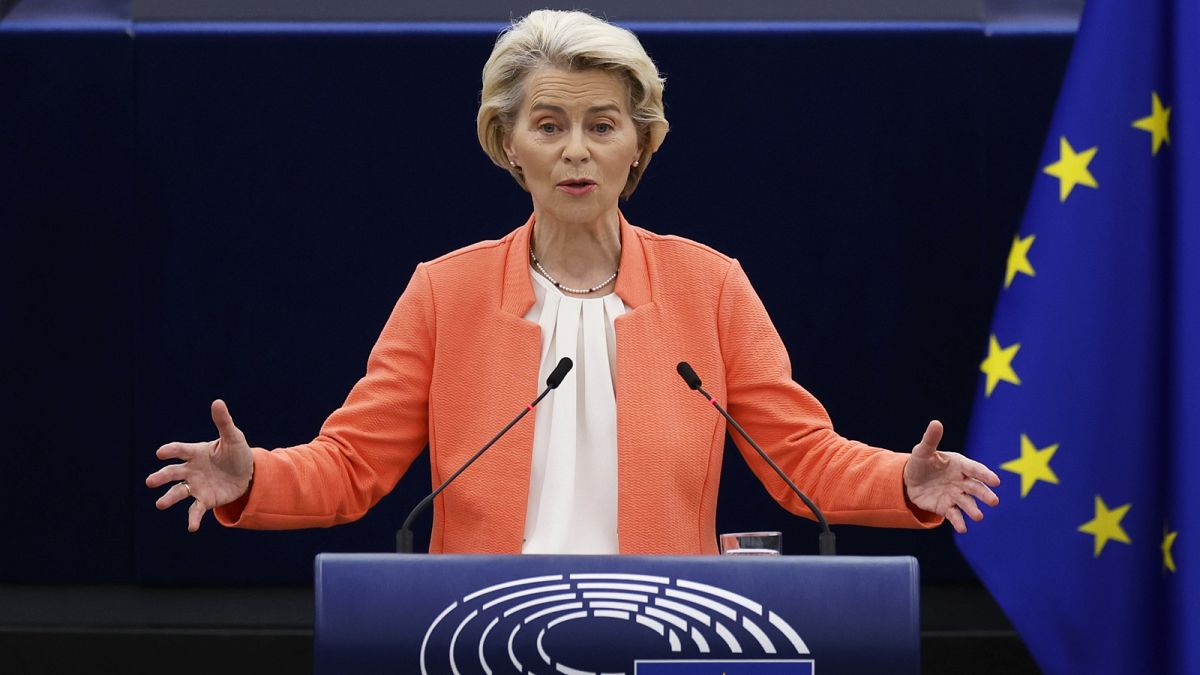European Commission President Ursula von der Leyen has announced an anti-subsidy inquiry into low-cost electric cars coming from China.
The electric vehicles sector is a "crucial industry for the clean economy, with a huge potential for Europe. But global markets are now flooded with cheaper Chinese electric cars. And their price is kept artificially low by huge state subsidies," von der Leyen said during her State of the Union speech in Strasbourg.
"This is distorting our market. And as we do not accept this from the inside, we do not accept this from the outside. So I can announce today that the Commission is launching an anti-subsidy investigation into electric vehicles coming from China," she went on, prompting applause from some members of the European Parliament.
"Europe is open to competition but not to a race to the bottom. We must defend ourselves against unfair practices."
The unexpected announcement marks a significant escalation in EU-China relations and represents a victory for France, which had pushed for the inquiry to be launched.
During her speech, von der Leyen drew a parallel between what happened in the past to the European solar industry and what could happen in the future to the European car industry, both of which face steep competition from their Chinese counterparts.
"Competition is only true as long as it is fair. Too often, our companies are excluded from foreign markets or are victims of predatory practices. They are often undercut by competitors benefitting from huge state subsidies," von der Leyen told MEPs.
"We have not forgotten how China’s unfair trade practices affected our solar industry. Many young businesses were pushed out by heavily subsidised Chinese competitors. Pioneering companies had to file for bankruptcy. Promising talents went searching for fortune abroad," she continued.
"This is why fairness in the global economy is so important – because it affects lives and livelihoods."
Right after the speech, Manfred Weber, president of the European People's Party (EPP) said: "We want a European Green Deal, not a Chinese one. We don't want to see Chinese electric vehicles benefiting from our ambitious climate approach".
State of the European Union address
Every year in mid-September, the president of the European Commission addresses a full house of the European Parliament and delivers the State of European Union address, a preview of the legislative initiatives envisioned for the following 12 months.
The occasion marks the official start of the EU's working year and coincides with the first plenary session after the summer break.
As the speech was the last one before the next parliament elections, von der Leyen seized the opportunity to showcase the political accomplishments achieved over the past year.
Economy, competitiveness and industrial policy featured prominently in the speech. Financial and military support for Ukraine, sanctions against Russia, climate action, digital regulation and migration reform were also addressed, together with a reflection on enlargement and the bloc's ability to welcome new member states.
Von der Leyen called for trade deals with Australia, Mexico and Mercosur to be closed by the end of the year as part of its so-called 'de-risking strategy', and announced she will task Mario Draghi with preparing a report on the future of European competitiveness.
She also stressed the need to deliver on the EU Green Deal while protecting farmers, families and industry. Speaking in German, she thanked Europe's farmers and called for “more dialogue and less polarisation”, in a nod to recent political tensions over the impact of EU environmental legislation on the agricultural sector.
In the most emotional part of her address, Von der Leyen paid tribute to Ukrainian writer Victoria Amelina, who was killed by a Russian missile while documenting war crimes in her home country.
Colombian writer Héctor Abad Faciolince, also present in the missile attack, has since launched a campaign to raise awareness of Russia’s war in Ukraine and held a photo of his friend Victoria in the Parliament’s chamber.
Speaking about the EU's potential enlargement, Von der Leyen signalled that the future of Ukraine, the Western Balkans and Moldova is within the European Union, but that the road ahead will not be easy.
While the EU works on adapting its treaties to accommodate more member countries, the Commission will look at how its key policies might be affected by enlargement, she said.
One thing that von der Leyen omitted: her own political future.
The Commission chief kept quiet on her desire to run for re-election as the leading candidate of the centre-right European People's Party (EPP).
Von der Leyen is believed to have a high chance of securing another five-year mandate, but whether she wants it or not, for the time being, is a matter of conjecture.
